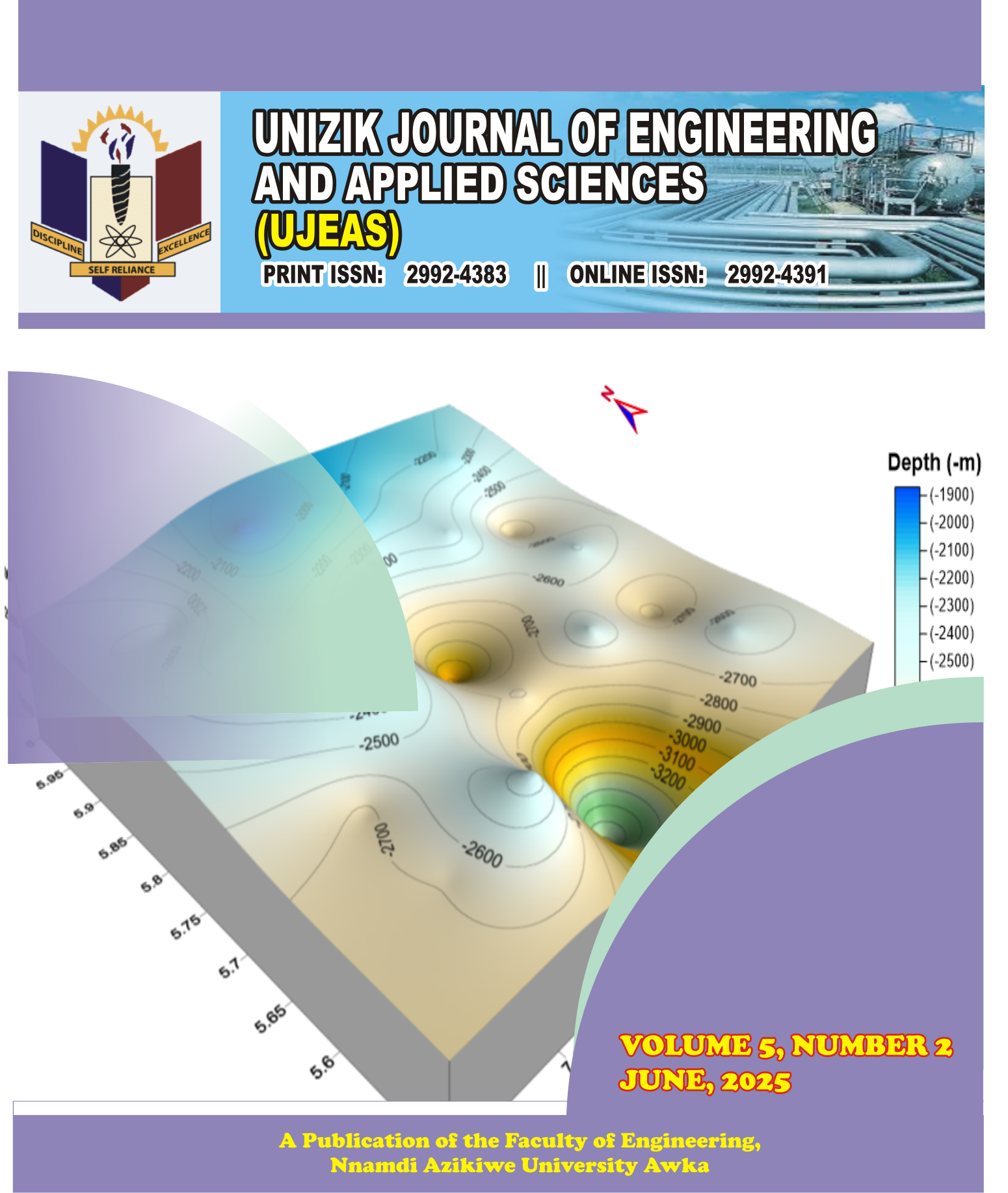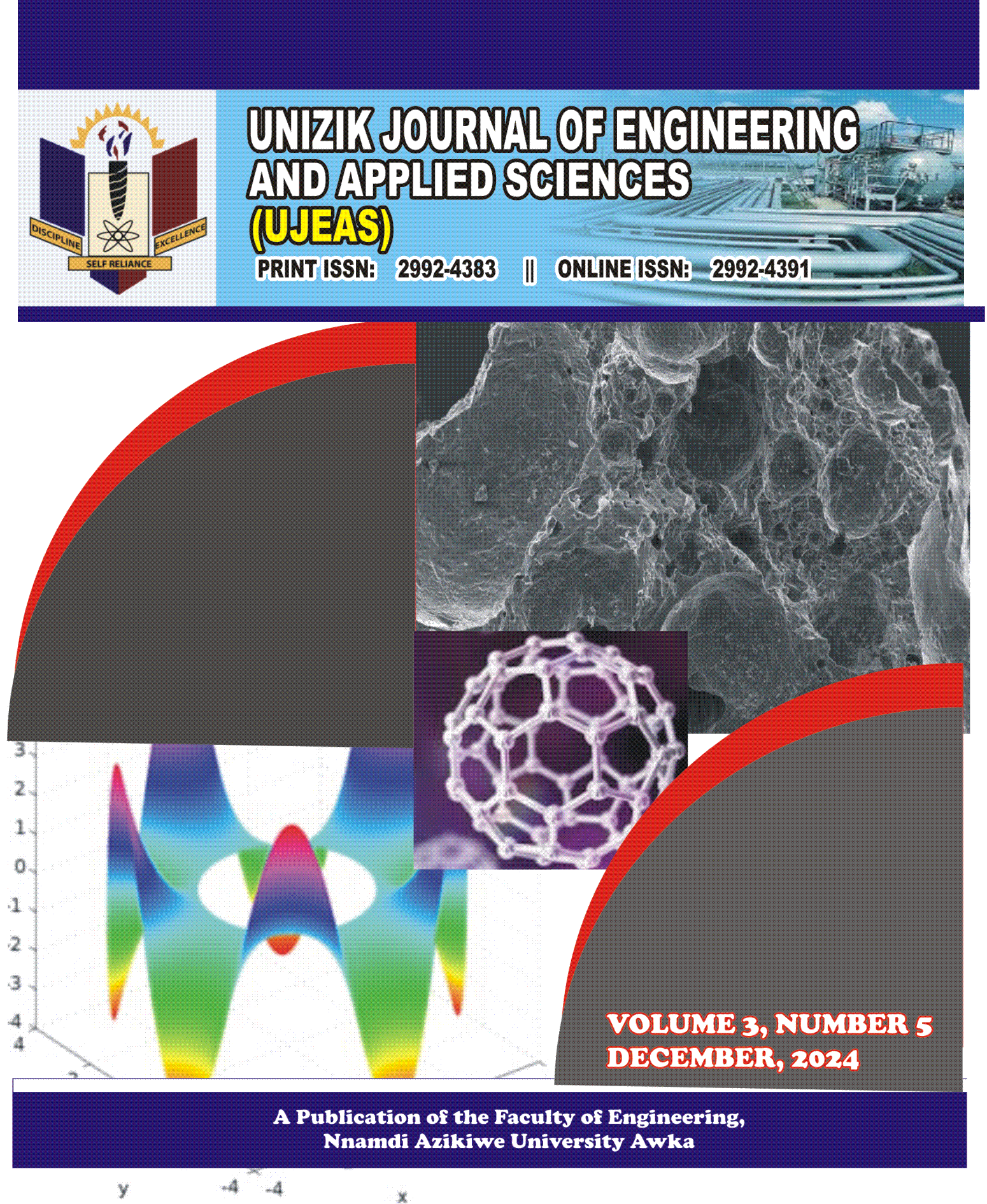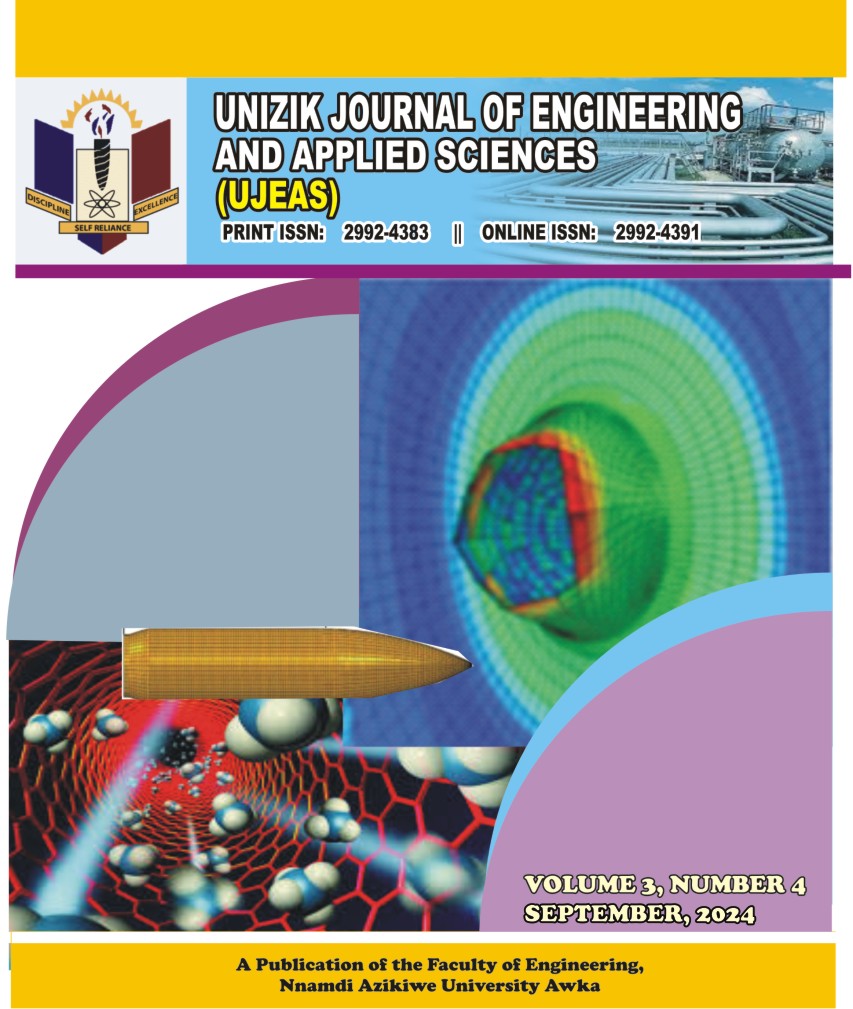Archives
-
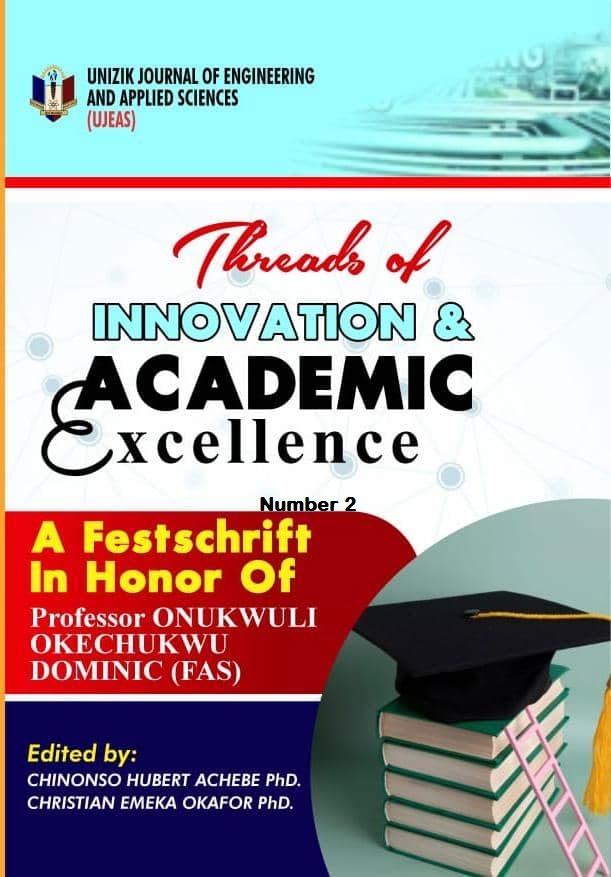
UNIZIK Journal of Engineering and Applied Sciences
Vol. 4 No. 2 (2025)This special issue (Number 2) is dedicated to Professor Onukwuli Okechukwu Dominic (FAS), marking his retirement and celebrating a remarkable career. It highlights his lasting contributions as a scholar and mentor.
PROFILE
Okechukwu Dominic Onukwuli, a chemical engineer, an eminent scholar, and a seasoned academician was born on August 5th, 1955 at Umuoji, Anambra State to late Mr Matthias Onukwuli and late Mrs Mercelina Onukwuli. He attended Saint John’s Primary School, Inalende, Ibadan from 1961 to 1966 and Saint Francis Catholic School, Mgbago, Umuoji in 1966. He had his post-primary education at Archbishop Heery Memorial Secondary Technical School, Ogidi (1970-1971) and Notre Dame High School, Abatete (1972-1974) where he completed his secondary education. He excelled in his studies and won for himself a Hungarian scholarship, awarded through the Bureau of External Aid for Education, to study chemical engineering in Hungary.
Professor Onukwuli obtained the B.Sc. (1979) and M.Sc. (1981) degrees in Chemical Engineering from Pannonia University in Veszprem, Hungary. He later earned a Ph.D. degree in 1988 from the University of Lagos. His academic career commenced in 1982 at Anambra State University of Technology, Enugu, and continued from 1992 to date at Nnamdi Azikiwe University, Awka. Onukwuli is internationally acclaimed for his work in the areas of catalysis, composites, hydrometallurgy, wastewater treatment, and local material valorization. He introduced a novel method of regeneration that successfully doubled the lifespan of the very expensive Pt-containing reforming catalyst and carried out a synthesis of efficient novel bio coagulants for wastewater treatment. He and Prof. Menkiti postulated the correlation constant – “the Menkonu constant” that relates single and multiangle nephelometry for the design of flocculators and developed an alkyd polycondensation reaction kinetic model of best-known accuracy. He has successfully demonstrated the use of palm kernel stearin (PKS) and rubber seed oil to innovatively synthesize non-oxidative drying alkyd resin that ensures production cost reduction and valorization of PKS to useful coating material.
Osoka and Onukwuli proposed a modification of the Halpin-Tsai equation, the Osoka-Onukwuli model, that improved its effectiveness in modeling composites from natural (plant) fibers as opposed to synthetic fibers. The new modified model gave modulus prediction that followed the profile of the experimental based on the R2 value. He also developed some local clay-based catalysts for biodiesel production and produced roofing sheets that meet standard water absorption and thermal properties using polyester-modified, cement raffia palm fiber ash composite. Professor Onukwuli has successfully supervised 47 Ph.D. and 65 master theses and has to his credit: 2 books, 10 book chapters, 520 journal articles, and over 30 refereed conference proceedings. For some years now, Professor Onukwuli has been adjudged one of the most cited and published researchers at Nnamdi Azikiwe University and Webometrics. His works has been cited 6827 times (scholar.google.com) with an h-index of 40 and i-10 index of 183. He was congratulated by Elsevier in 2024 for publishing 8 open access journal articles between 2020-2022, six of which were linked to the United Nations Sustainable Development Goals, helping to tackle some of the World’s greatest challenges. Currently, over ten of his former students have been elevated to the rank of professor.
At different times during his career, he was Head of the Department of Chemical Engineering, Faculty of Engineering Representative to the University Senate, Dean of the Faculty of Engineering, Project Manager, at Nnamdi Azikiwe University, STEP B Project, Chairman of the Emeritus Professorship Committee, and a member of many Academy of Engineering Committees and Nnamdi Azikiwe University Senate Committees. He had participated in many NUC and COREN accreditation exercises as a member/chairman of many universities in the country. He had also served as Editor-in-chief, Editorial Board Member, and Consulting Editor of several reputable journals. He has been honored by various professional organizations, various student bodies, and by his communities for his leadership efforts.
Professor Onukwuli is a COREN registered engineer, a fellow of the Nigerian Society of Chemical Engineers; a Fellow of, the Materials Science and Technology Society of Nigeria; a Fellow, of the Nigerian Society of Engineers; a Fellow of, the Nigerian Academy of Engineers, and a Fellow, Nigerian Academy of Sciences. He is married to Dr Vivian Ozoemena Onukwuli, an Associate Professor of Pediatrics at the Department of Pediatrics, University of Nigeria, Enugu Campus and they are blessed with children, Dr Chibuikem Okechukwu Onukwuli and Kamsiyochukwu Chimebuka Onukwuli.
-

UNIZIK Journal of Engineering and Applied Sciences
Vol. 4 No. 1 (2025)This special issue (Number 1) is dedicated to Professor Onukwuli Okechukwu Dominic (FAS), marking his retirement and celebrating a remarkable career. It highlights his lasting contributions as a scholar and mentor.
PROFILE
Okechukwu Dominic Onukwuli, a chemical engineer, an eminent scholar, and a seasoned academician was born on August 5th, 1955 at Umuoji, Anambra State to late Mr Matthias Onukwuli and late Mrs Mercelina Onukwuli. He attended Saint John’s Primary School, Inalende, Ibadan from 1961 to 1966 and Saint Francis Catholic School, Mgbago, Umuoji in 1966. He had his post-primary education at Archbishop Heery Memorial Secondary Technical School, Ogidi (1970-1971) and Notre Dame High School, Abatete (1972-1974) where he completed his secondary education. He excelled in his studies and won for himself a Hungarian scholarship, awarded through the Bureau of External Aid for Education, to study chemical engineering in Hungary.
Professor Onukwuli obtained the B.Sc. (1979) and M.Sc. (1981) degrees in Chemical Engineering from Pannonia University in Veszprem, Hungary. He later earned a Ph.D. degree in 1988 from the University of Lagos. His academic career commenced in 1982 at Anambra State University of Technology, Enugu, and continued from 1992 to date at Nnamdi Azikiwe University, Awka. Onukwuli is internationally acclaimed for his work in the areas of catalysis, composites, hydrometallurgy, wastewater treatment, and local material valorization. He introduced a novel method of regeneration that successfully doubled the lifespan of the very expensive Pt-containing reforming catalyst and carried out a synthesis of efficient novel bio coagulants for wastewater treatment. He and Prof. Menkiti postulated the correlation constant – “the Menkonu constant” that relates single and multiangle nephelometry for the design of flocculators and developed an alkyd polycondensation reaction kinetic model of best-known accuracy. He has successfully demonstrated the use of palm kernel stearin (PKS) and rubber seed oil to innovatively synthesize non-oxidative drying alkyd resin that ensures production cost reduction and valorization of PKS to useful coating material.
Osoka and Onukwuli proposed a modification of the Halpin-Tsai equation, the Osoka-Onukwuli model, that improved its effectiveness in modeling composites from natural (plant) fibers as opposed to synthetic fibers. The new modified model gave modulus prediction that followed the profile of the experimental based on the R2 value. He also developed some local clay-based catalysts for biodiesel production and produced roofing sheets that meet standard water absorption and thermal properties using polyester-modified, cement raffia palm fiber ash composite. Professor Onukwuli has successfully supervised 47 Ph.D. and 65 master theses and has to his credit: 2 books, 10 book chapters, 520 journal articles, and over 30 refereed conference proceedings. For some years now, Professor Onukwuli has been adjudged one of the most cited and published researchers at Nnamdi Azikiwe University and Webometrics. His works has been cited 6827 times (scholar.google.com) with an h-index of 40 and i-10 index of 183. He was congratulated by Elsevier in 2024 for publishing 8 open access journal articles between 2020-2022, six of which were linked to the United Nations Sustainable Development Goals, helping to tackle some of the World’s greatest challenges. Currently, over ten of his former students have been elevated to the rank of professor.
At different times during his career, he was Head of the Department of Chemical Engineering, Faculty of Engineering Representative to the University Senate, Dean of the Faculty of Engineering, Project Manager, at Nnamdi Azikiwe University, STEP B Project, Chairman of the Emeritus Professorship Committee, and a member of many Academy of Engineering Committees and Nnamdi Azikiwe University Senate Committees. He had participated in many NUC and COREN accreditation exercises as a member/chairman of many universities in the country. He had also served as Editor-in-chief, Editorial Board Member, and Consulting Editor of several reputable journals. He has been honored by various professional organizations, various student bodies, and by his communities for his leadership efforts.
Professor Onukwuli is a COREN registered engineer, a fellow of the Nigerian Society of Chemical Engineers; a Fellow of, the Materials Science and Technology Society of Nigeria; a Fellow, of the Nigerian Society of Engineers; a Fellow of, the Nigerian Academy of Engineers, and a Fellow, Nigerian Academy of Sciences. He is married to Dr Vivian Ozoemena Onukwuli, an Associate Professor of Pediatrics at the Department of Pediatrics, University of Nigeria, Enugu Campus and they are blessed with children, Dr Chibuikem Okechukwu Onukwuli and Kamsiyochukwu Chimebuka Onukwuli.
-

UNIZIK Journal of Engineering and Applied Sciences
Vol. 3 No. 3 (2024)This themed issue pays tribute to Professor Clement Uche Atuanya in recognition of his illustrious career in Metallurgical and Materials Engineering as he retires from Nnamdi Azikiwe University, Awka. We celebrate his enduring legacy of dedication to advancing knowledge and his impact on academia and beyond through this collection of writings.
Citation
Engr. Prof. Clement Uche Atuanya was born on January 26, 1954, in Umuoji, Anambra State, Nigeria. He attended the Federal School of Arts and Science in Aba, Abia State, from 1976 to 1977, St. Joseph Secondary School in Awka-Etiti, from 1970 to 1974, and Sacred Heart Primary School in Odoapku, Onitsha, from 1962 to 1968. He obtained a Federal Government of Nigeria Scholarship that is valid in Russia (Bureau for External Aid). 1977 - 1983, he left Nigeria to further his education at Leningrad (Petersburg) Engineering University, St. Petersburg, Russia (1977 - 1978) and the National University of Science and Technology, Moscow (Moscow Institute of Steel and Alloys, Moscow, Russia (1978 - 1983), where he completed his master's program. He served as an industrial attachee at the Zaporizhzhya Steel Industry in Ukraine from July to August 1978, and at the Steel Industry Donetsk in Ukraine from July to October 1982. He returned to Nigeria and worked at the College of Technology (Federal Polytechnic) Nekede, Owerri, Imo State (1985-1987), Institute of Management and Technology (IMT) Enugu (1987-1989), and Nnamdi Azikiwe University in Awka from 1992 before retirement. Professor Clement Atuanya has taught and supervised more than 8 M.Eng students and one PhD student. He is an effective researcher and writer, having published over 50 journal articles both locally and internationally. He has worked as both an internal and external examiner for postgraduate programs at various Nigerian universities.
Citation by
Prof. Chukwuka Ikechukwu Nwoye,
Department of Metallurgical and Materials Engineering,
Nnamdi Azikiwe University Awka.
-

UNIZIK Journal of Engineering and Applied Sciences
Vol. 3 No. 2 (2024)This themed issue honors Professor Ekedimogu Eugene Nnuka, celebrating his distinguished career upon his retirement. His legacy of exemplary scholarship, mentorship, and commitment to advancing knowledge is commemorated in this collection of works.
Citation
Engr. Prof. Eugene Ekedumogu Nnuka was born on November 28, 1954, in Ukpor, Anambra State, Nigeria. He attended Government College in Umuahia from 1970 to June 1974 and earned a Grade 1 "Distinction." He was the best entrant during the 1967 entrance and interview year and received a first-place scholarship (£60) per year. Similarly, he received a scholarship to complete his university studies from beginning to end through the Bureau for External Aid in collaboration with the USSR government. He received numerous scholarships, including the Eastern Regional Government Scholarship (1970-1974), the Belarus for External Aid Scholarship (1976-1985), and the Academic Excellence Award (UIU) in 2010. He also finished his master's program at the Belarus University of Engineering in 1982 and his PhD program at the Belarus State Academy of Sciences (Institute of Physical and Technical Sciences) in 1985. He briefly worked at the Minsk Heating Equipment Factory (Asst.Technologist-1979), the Minsk Motor Industry (Technologist-1980), the Jdanov Metallurgical Complex (Engr. 1981), and the Minsk Automatic Lines Industry (Engr. 1982). He returned to Nigeria and worked at the University of (Jos) Agriculture Makurdi from 1985 to 2005, before moving on to Nnamdi Azikiwe University in Awka from 2005 to date. Some of his notable achievements include the establishment of the Unizik foundry workshop, fellowship of the Nigerian Metallurgical Society (NMS), presidency of the NMS at the national level, and stabilization of the Department of Metallurgical and Materials Engineering at Nnamdi Azikiwe University Awka. Professor Eugene Nnuka has taught and supervised more than 40 M.Eng. and 20 PhD students. He is an excellent researcher and writer, having published over 100 journal articles, both locally and internationally. He has attended more than 30 national and international conferences. He has also worked in a variety of capacities in his community, Ukpor, the university, and Nigeria.
Citation by
Dr. Chidume Nwambu,
Head,
Department of Metallurgical and Materials Engineering,
Nnamdi Azikiwe University Awka.
-

UNIZIK Journal of Engineering and Applied Sciences
Vol. 3 No. 1 (2024)Formerly known as the Journal of Engineering and Applied Sciences
-

UNIZIK Journal of Engineering and Applied Sciences
Vol. 2 No. 3 (2023)Formerly known as the Journal of Engineering and Applied Sciences
-
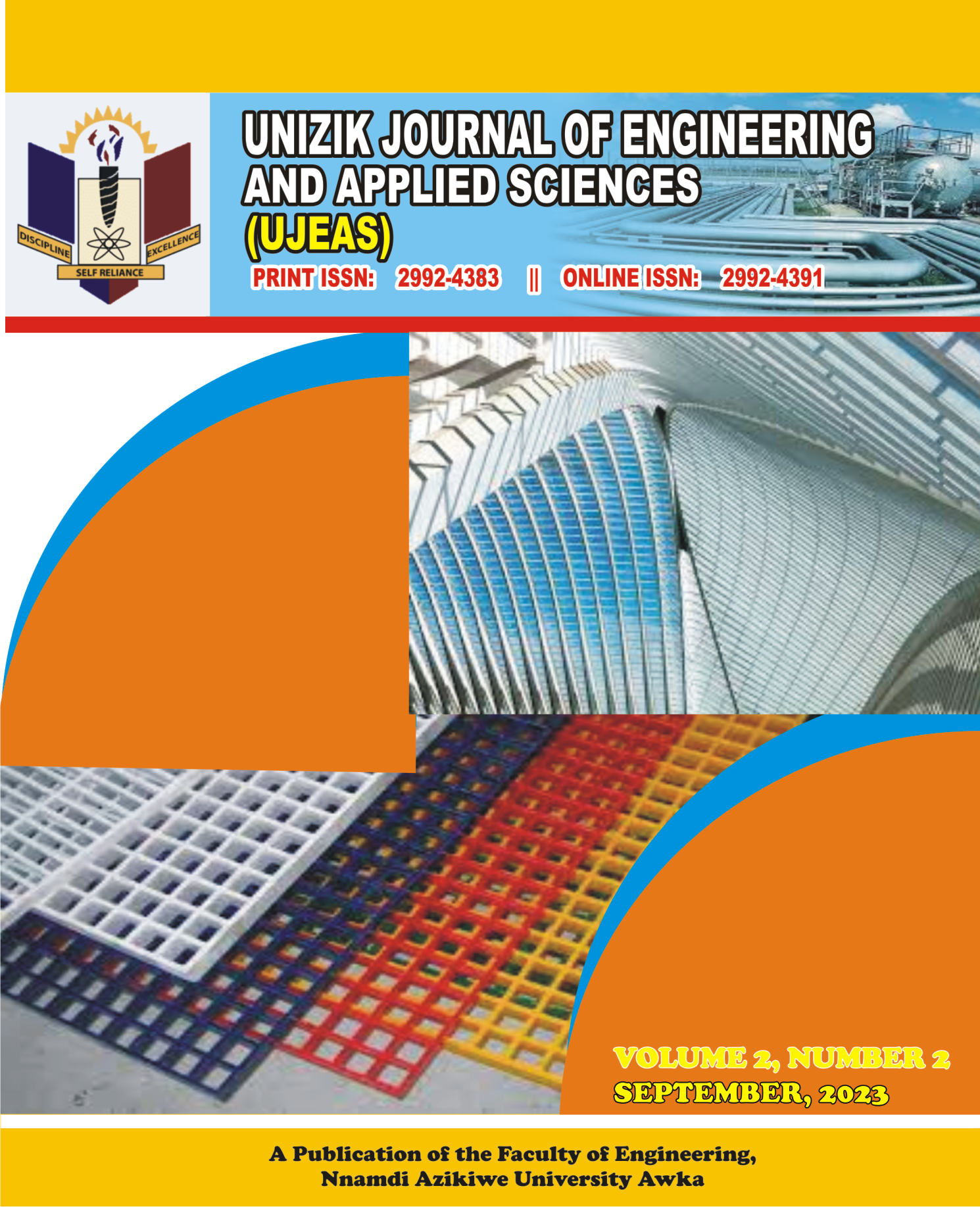
UNIZIK Journal of Engineering and Applied Sciences
Vol. 2 No. 2 (2023)Formerly known as the Journal of Engineering and Applied Sciences
-

UNIZIK Journal of Engineering and Applied Sciences
Vol. 2 No. 1 (2023)Formerly known as the Journal of Engineering and Applied Sciences
-

MAIDEN EDITION|UNIZIK Journal of Engineering and Applied Sciences
Vol. 1 No. 1 (2023)Formerly known as the Journal of Engineering and Applied Sciences
-
Journal of Engineering and Applied Sciences
Vol. 22 No. 1 (2023)The Journal of Engineering and Applied Sciences is continued as UNIZIK Journal of Engineering and Applied Sciences
-
Journal of Engineering and Applied Sciences
Vol. 21 No. 1 (2022)The Journal of Engineering and Applied Sciences is continued as UNIZIK Journal of Engineering and Applied Sciences
-
Journal of Engineering and Applied Sciences
Vol. 20 No. 1 (2022)The Journal of Engineering and Applied Sciences is continued as UNIZIK Journal of Engineering and Applied Sciences
-
Journal of Engineering and Applied Sciences
Vol. 19 No. 1 (2021)The Journal of Engineering and Applied Sciences is continued as UNIZIK Journal of Engineering and Applied Sciences
-
Journal of Engineering and Applied Sciences
Vol. 18 No. 1 (2021)The Journal of Engineering and Applied Sciences is continued as UNIZIK Journal of Engineering and Applied Sciences
-
Journal of Engineering and Applied Sciences
Vol. 17 No. 1 (2020)The Journal of Engineering and Applied Sciences is continued as UNIZIK Journal of Engineering and Applied Sciences
-
Journal of Engineering and Applied Sciences
Vol. 16 No. 1 (2020)The Journal of Engineering and Applied Sciences is continued as UNIZIK Journal of Engineering and Applied Sciences
-
Journal of Engineering and Applied Sciences
Vol. 15 No. 1 (2019)The Journal of Engineering and Applied Sciences is continued as UNIZIK Journal of Engineering and Applied Sciences
-
Journal of Engineering and Applied Sciences
Vol. 14 No. 1 (2018)The Journal of Engineering and Applied Sciences is continued as UNIZIK Journal of Engineering and Applied Sciences
-
Journal of Engineering and Applied Sciences
Vol. 13 No. 1 (2018)The Journal of Engineering and Applied Sciences is continued as UNIZIK Journal of Engineering and Applied Sciences
-
Journal of Engineering and Applied Sciences
Vol. 12 No. 1 (2017)The Journal of Engineering and Applied Sciences is continued as UNIZIK Journal of Engineering and Applied Sciences
-
Journal of Engineering and Applied Sciences
Vol. 11 No. 1 (2015)The Journal of Engineering and Applied Sciences is continued as UNIZIK Journal of Engineering and Applied Sciences

